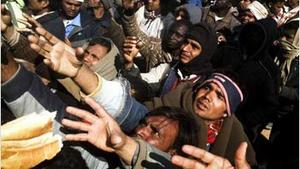Libya updateMilitary stalemate, growing humanitarian crisis
The Libyan air force no longer exists, Libya’s air defense are crippled, and much of Gaddafi’s heavy armor has been destroyed; still, the leaderless, disorganized, ill-equipped, and untrained rebels cannot take military advantage of the situation; the stalemate is creating a growing humanitarian crisis: almost half a million people had left the country since the crisis began, about 330,000 people have been internally displaced, and the UN estimates that as many 3.6 million people could eventually require humanitarian assistance; on the diplomatic front, though, the rebels, for the first time, participated in a high-level diplomatic meeting in Doha — the summit of the newly formed Contact Group on Libya, which called on Gaddafi to stand down

At the Libya-Tunisia border // Source: christianmessenger.in
The rag-tag forces of the anti-Gaddafi forces have been unable to exploit the air cover given to them by the NAT-led coalition to exert a meaningful military pressure on Col. Gaddafi’s forces. The coalition’s hope was that the air attacks which have crippled Libya’s air defenses, destroyed its air force, and inflicted a heavy blow against Libya’s heavy armor would be enough to persuade Gaddafi to leave – or enough to persuade the military leadership to help him leave. This has not happened, and Gaddafi and his associates have been clever in adapting to the new realities. They have learned to use their military forces and local and foreign militias in urban settings, often using pick-up truck and soldiers out of uniforms, making it difficult for coalition forces to identify and hit them.
The rebels may be exaggerating when they say that 100,000 Libyans have already been killed, by other figures provided by the UN are disturbing: The BBC reports that UN studies show that
- almost half a million people had left the country since the crisis began
- about 330,000 people have been internally displaced
- as many 3.6 million people could eventually require humanitarian assistance
If the rebels appear incapable of a coherent and effective military campaign, they been scoring points on the diplomatic front. A newly formed international Contact Group on Libya has called on Col. Gaddafi to stand down. The call was made by Qatar’s prime minister following the Contact Group summit in Doha. The rebels sent a delegation to the summit – their first participation in a high-level diplomatic meeting.
The Contact Group was formed at an international ministerial conference in London on 29 March and includes European powers, the United States, allies from the Middle East, and a number of international organizations.
The summit participants committed themselves to providing “material aid” to the rebel – but it was not clear whether or not this also meant arms.
Earlier this week the leadership of the rebels – called the Transitional National Council (TNC) — rejected the African Union’s proposal for a ceasefire, because the proposal did not provide for Col. Gaddafi’s immediate departure. The proposal was also unclear about whether or not Gaddafi’s sons would continue to be involved in Libyan affairs even after their father resigned from office.
